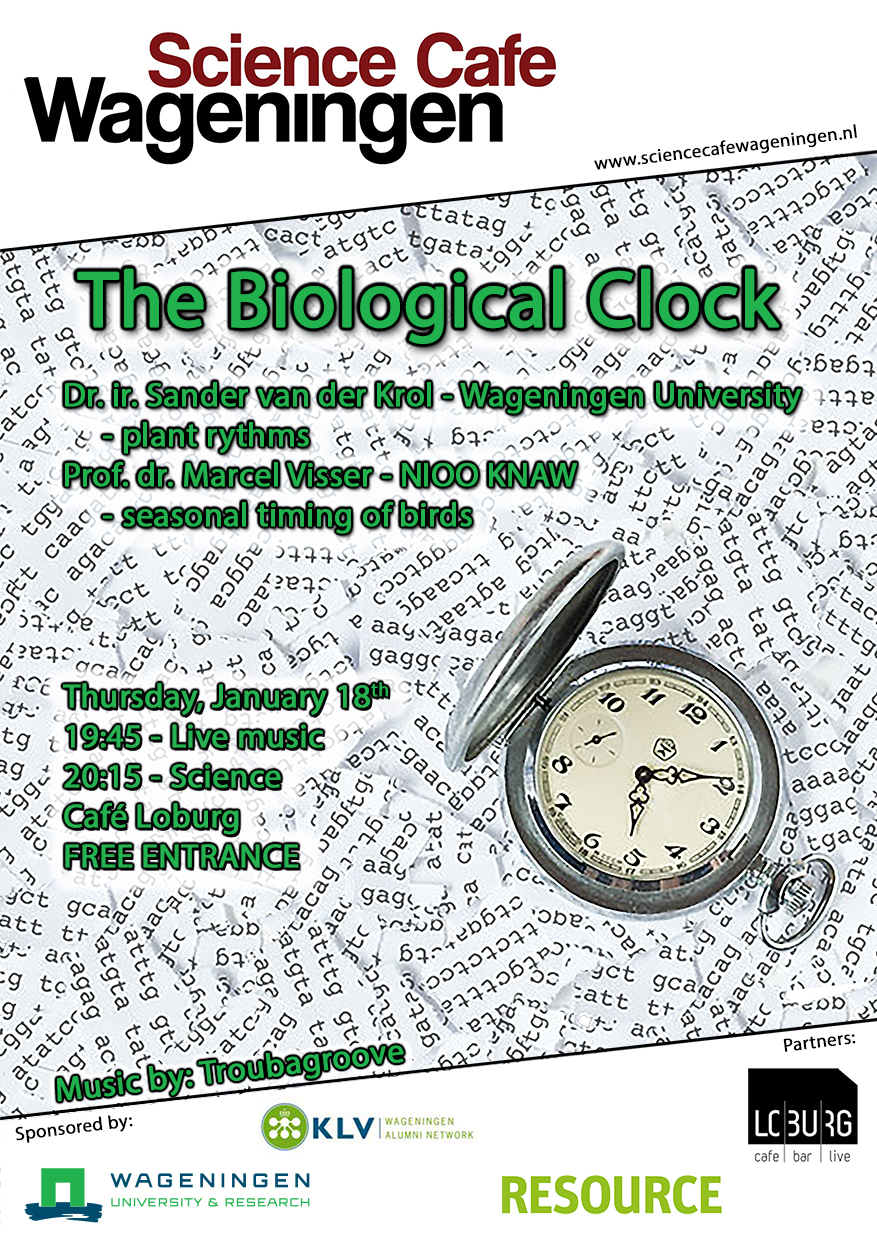 Thursday January 18th
Thursday January 18th
19:45 live music
20:15 speakers
Café Loburg
Many living organisms, from humans to cyanobacteria, have an internal, biological clock. This clock is essential to help organisms adapt to daily (but also seasonal) environmental fluctuations. Although clock genes may differ between different organisms, the principle of the clock is always the same: a sustained oscillation with a period of approximately 24 hours which ‘gates’ the responses to environmental cues for optimal performance. How can the clock keep its rhythm of 24 hours when it is cold and molecules move slower? How is the internal clock used to measure time and how does it regulate interaction between organisms? What is the impact of climate change and light pollution on biological timing? Why are a record number of horticultural companies participating in projects on the clock in plants? Why was the Nobel prize awarded 2017 to those who first elucidated the mechanism of the clock? These exciting questions (and more) will be addressed by our speakers who are internationally known experts on the biological clock. Clearly a Science cafe session you do not want to miss, be in time!
Dr. Sander van der Krol is Associate Professor at the Lab. of Plant Physiology (WUR) since 1998. His PhD in Amsterdam on silencing of floral pigmentation genes in Petunia started the road to discovery of RNAi in eukaryotes. During his 4 year post-doc at Rockefeller University he worked on transcription factors (TF), changing petunia floral petals by silencing floral MADSbox genes and identified TF nuclear import signals. At that time at Rockefeller University the work on the clock in plants was initiated, in which the use of ‘glowing plants’ as reporter was instrumental. Back in the Netherlands he introduced this system at WUR to study gene expression dynamics in plants. Currently projects involve the control of plant growth in greenhouses by dissecting the molecular pathway of clock temperature entrainment. Sander teaches the principles of the clock in the course ‘Time-perception’ and at the Science cafe Wageningen he will present: From Caves to Nobel Prize.
Prof. Marcel E. Visser (NIOO-KNAW, WUR, RuG) obtained his PhD on the life-history of insect parasitoids from Leiden University. He continued his parasitoids research at Imperial College (UK) but shifted systems thereafter, when he became a post-doc at the NIOO-KNAW, working on seasonal timing in great tits. The main interests of Marcel Visser are the interaction between ultimate and proximate aspects of timing, particularly in the Oak – Winter Moth – Great Tit/Pied Flycatcher system. His work has been supported by several prestigious personal grants (VICI in 2007, ERC Advanced grant 2014). Since 2015 he has been included in the Thomson Reuters list of Highly Cited Researchers and in 2017 he was elected a Fellow of the Royal Netherlands Academy of Sciences (KNAW). In June 2005 Prof. Visser was appointed as Professor on Seasonal Timing of Behaviour at Groningen University and in April 2012 Professor on Ecological genetics at Wageningen University, but he remains based at the NIOO-KNAW where he is head of Department Animal ecology since 2002. At the Science cafe Wageningen he will present: Daily and seasonal clocks in a warmer and brighter world.
